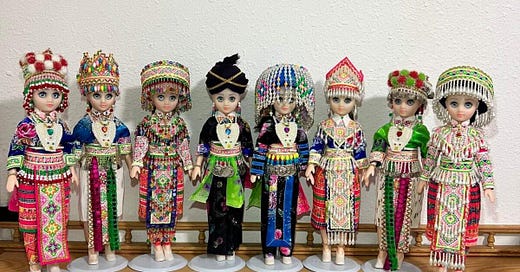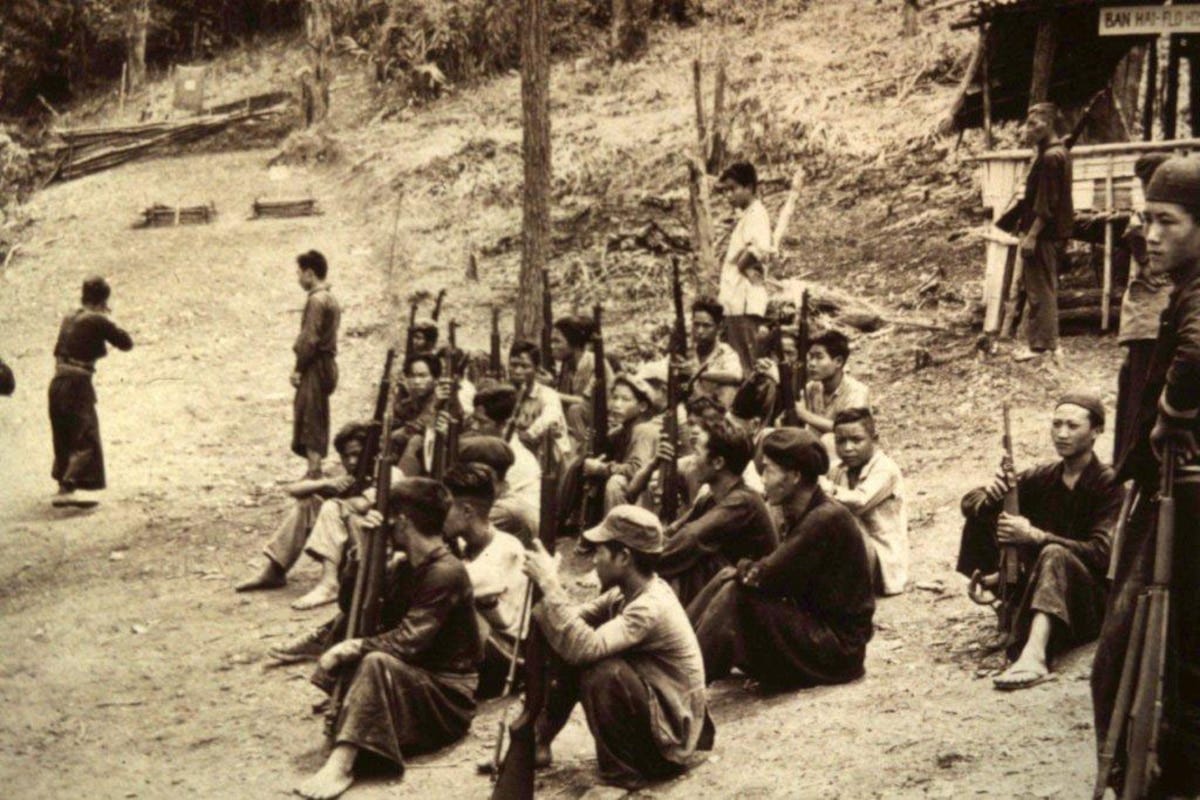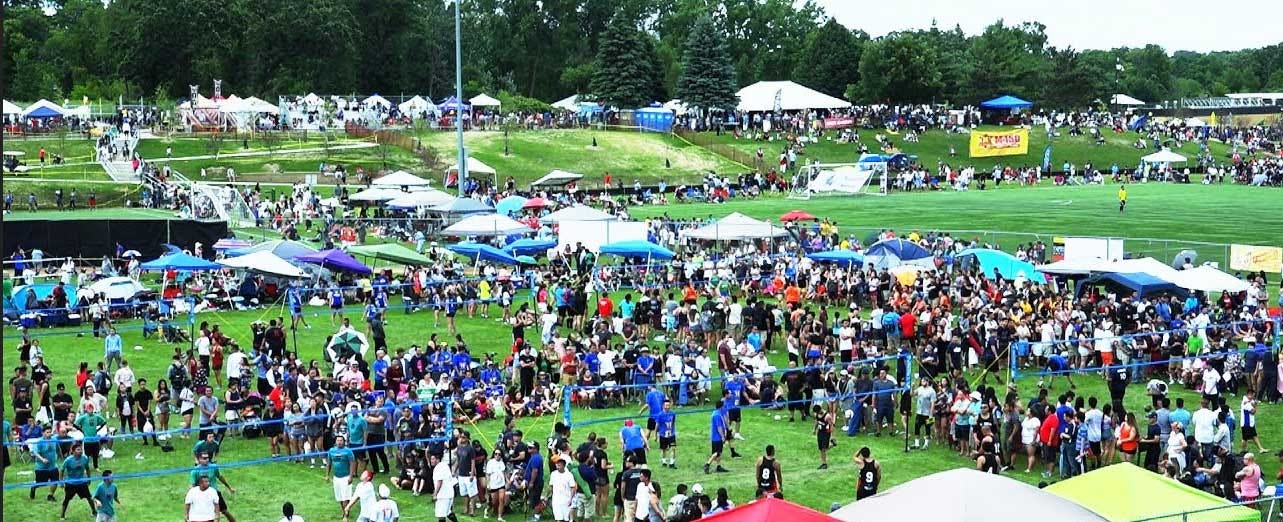From Exile to Strength
reviving a tradition of resilience and spirit: what the hmong could learn from the jewish people, and what it means to be a romantic holistic conservative
The Jewish people’s resilience throughout history is nothing short of remarkable. They’ve withstood centuries of persecution, exile, and genocide, yet maintained a fierce commitment to their faith, culture, and identity. Their survival isn't just tied to land but to something deeper—their collective spirit, their sacred rituals, and the determination that Nietzsche would recognize as the Will to Power, the drive to assert life even in the face of overwhelming adversity. The Jewish story is a testament to how people can rise above the forces that would seek to extinguish them. For the Hmong people, who have faced our own trials of displacement and cultural erosion, there are critical lessons to be learned from the Jewish experience.
We, like the Jews, have been scattered and uprooted by historical forces beyond our control. Yet, unlike the Jews, the Hmong have not reclaimed a homeland nor revived a strong sense of cultural asabiyyah. Instead, we stand at a crossroads, at risk of losing what remains of our ancestral identity in the face of modernity’s relentless march. To survive and thrive, we must reclaim what I have spoken of before: a Will to Self-Determination. Without this, we will be absorbed into the anonymous flow of history, becoming just another group that modernity has chewed up and spat out.
Ritual as the Anchor of Identity
Byung-Chul Han’s The Disappearance of Ritual describes how modern life has hollowed out once-sacred practices, turning them into empty gestures devoid of meaning. The Jewish people resisted this hollowing out by holding on to their rituals—Sabbath, Passover, and Yom Kippur—which remain sacred acts that bind them together, not merely performances. Nietzsche, in his Genealogy of Morals, would see this as the power of traditions to shape identity and impart meaning to suffering, transforming life’s agonies into something purposeful rather than chaotic.
The Hmong have their own sacred rituals, rooted in shamanism and ancestral worship. These are not just customs, but acts that connect us to our spiritual past and the wisdom of our ancestors. Yet, as modernity encroaches, these rituals risk fading into obscurity, becoming mere curiosities or folklore. For the Hmong, our survival depends on reanimating these sacred rituals, infusing them with new life so that they are not just relics of a bygone era but living practices that sustain our identity in a world that seeks to homogenize and erase cultural differences.
Fustel de Coulanges, in The Ancient City, shows us how rituals were once the bedrock of communal life, tying citizens to their city, their ancestors, and the divine. For the Hmong, our future hinges on reviving this sacred bond—not just as a means of cultural preservation but as a profound assertion of who we are in the face of an increasingly rootless world.
The Will to Self-Determination
Nietzsche's concept of the Will to Power emphasizes that life is driven by the force of will, the urge to overcome, to grow, to dominate one’s circumstances. The Jewish people exemplify this Will to Power in their persistence and refusal to be extinguished despite the myriad forces arrayed against them. This same determination must be reignited within the Hmong. As Julius Evola argues in Revolt Against the Modern World, traditional societies thrive when they resist the leveling forces of modernity and assert their own spiritual hierarchy. The Jewish people have shown that even without land, a people can maintain their identity through a strong cultural and spiritual ethos. They never ceded their identity to the forces that sought to erase them; they stood firm in the face of adversity, maintaining a sacred continuity with their past.
The Hmong people must rediscover this Will to Self-Determination. This isn’t just about land or politics; it’s about reclaiming the spiritual core that once defined us. Evola’s ideal of the aristocratic spirit—a people who are noble, transcendent, and disdainful of the materialism that defines modernity—should guide us. The Hmong have long been a proud people, but our current path risks leading us to cultural extinction if we do not reassert our identity, reclaim our rituals, and establish a cohesive sense of purpose.
Resisting Modernity’s Pull
Alexander Dugin, in The Fourth Political Theory, warns of the dangers of modernity’s flattening effect. Liberalism, with its emphasis on individual rights and material success, erodes the bonds that tie communities together. It replaces collective identity with atomized existence, dissolving the sacred in favor of economic and political expedience. The Hmong must resist this pull. Like the Jewish people, we must engage with modernity without allowing it to strip us of our identity. Modernity tempts us with its comforts and conveniences, but these come at the cost of our cultural soul. We must take from modernity what benefits us, but always remain rooted in the ancient traditions that have sustained our people for centuries.
Dugin reminds us that modernity is not neutral—it is a battleground of ideas and values. If we do not assert our own cultural vision, we will be swept aside by the forces of global homogenization. The Jewish people’s survival is a testament to what can be achieved when a people refuses to be absorbed into the dominant culture and instead reasserts its own narrative, its own traditions, its own values. The Hmong must follow this example if we are to survive the pressures of assimilation.
Reawakening the Sacred Will
The Jewish people’s survival offers a blueprint for the Hmong. Their ability to maintain their cultural and spiritual identity in the face of persecution, exile, and modernity’s pressures is a testament to the power of tradition and the Will to Self-Determination. We, too, must revive our rituals, rebuild our communal bonds, and reassert our identity in a world that seeks to erase it. Nietzsche, Evola, and Dugin all remind us that the forces of modernity are powerful but not invincible. The Hmong can overcome these forces by reclaiming our sacred traditions, just as the Jewish people have done.
The path forward is clear: we must resist the hollowing effects of modernity and rekindle the sacredness of our rituals. Like the Jewish people, we must assert our identity with confidence and purpose, ensuring that our culture survives for future generations. The Jewish people have shown us the way—now it is time for the Hmong to reclaim our own destiny, to harness our own Will to Power, and to walk our own path toward cultural survival and spiritual renewal.
Rediscovering Who We Are
At the heart of all this is a rediscovery of who we are. Alexander Dugin, in Noomakhia, speaks of the distinct logoi of different peoples. What is the Hmong logos? What is the American logos? Dugin identifies Pragmatism as the American logos, but what about the Hmong?
This journey is not just about survival but about the assertion of identity—being proud to be Hmong, American, or Jewish. It’s about the existential pride that comes from Being, from the embodiment of what it means To Be. The geopolitics of this are significant, but at its core, this is a question of the dignity that accompanies identity. How do we assert ourselves as Hmong in the modern world without losing our soul to it? How do we reconcile the pride of being Hmong with the demands of American pragmatism?
My metaphysical ponderings ultimately circle around this: the tension between our ancient roots and the modern world, between preserving the greatness of who we’ve always been and evolving into who we are becoming. The path forward is in reclaiming our logos, and asserting it with pride, whether that’s as a Hmong, an American, or a Jewish Zionist. This is the essence of self-determination, of survival with dignity. To live, not just by existing, but by Being—and taking pride in it.
And perhaps this is what Romantic Holistic Conservatism embodies. The recognition that identity, culture, and tradition cannot survive by mere preservation alone but must be lived through a passionate engagement with the world. It’s about embracing the depth of our roots while evolving in harmony with modernity, without losing the essence of who we are. It balances the sacredness of tradition with the need for personal and collective actualization, asserting the logos of a people with pride, vitality, and dignity—rooted in being, but always aspiring toward greatness.
Romantic Holistic Conservatism, then, is a philosophy of self-determination through the integration of past, present, and future—a belief in the Being of one's culture and its potential to flourish when nurtured by both reverence for tradition and the courage to adapt and evolve.






